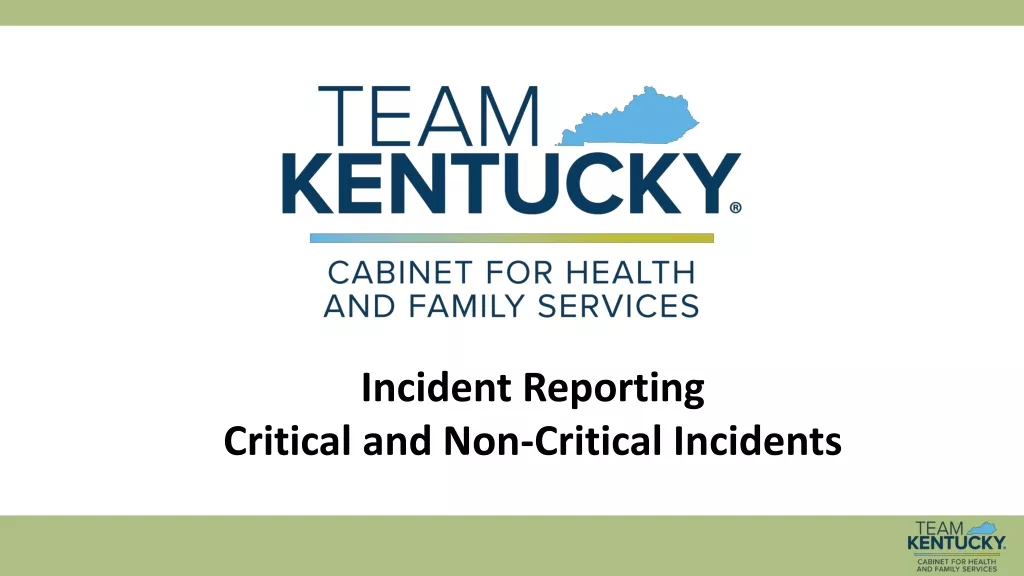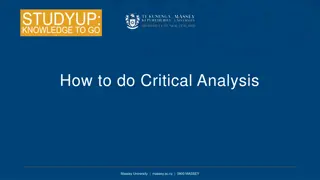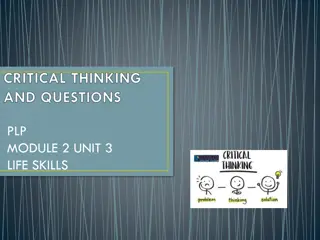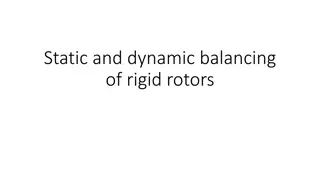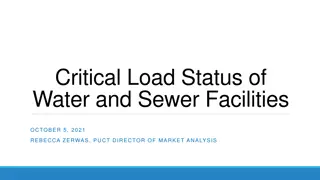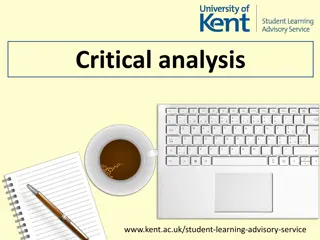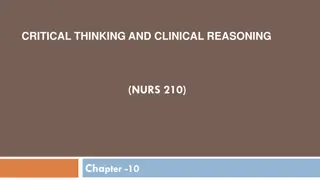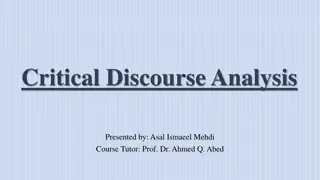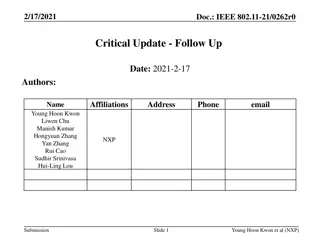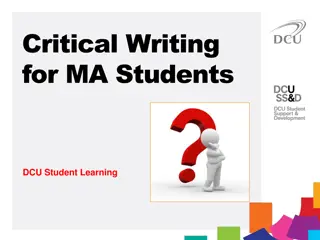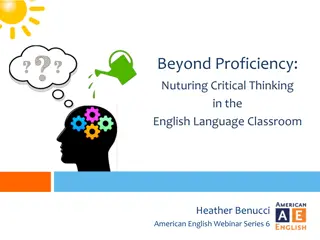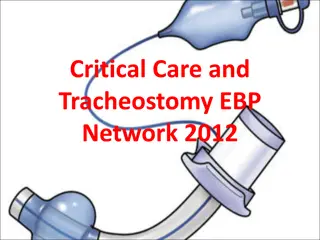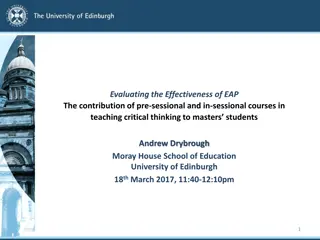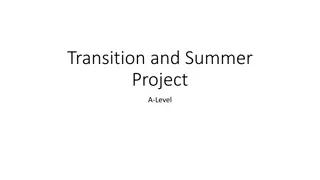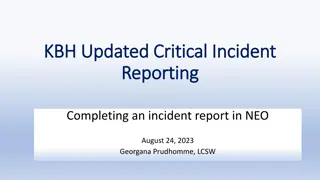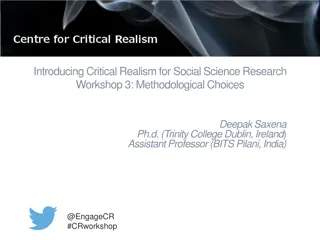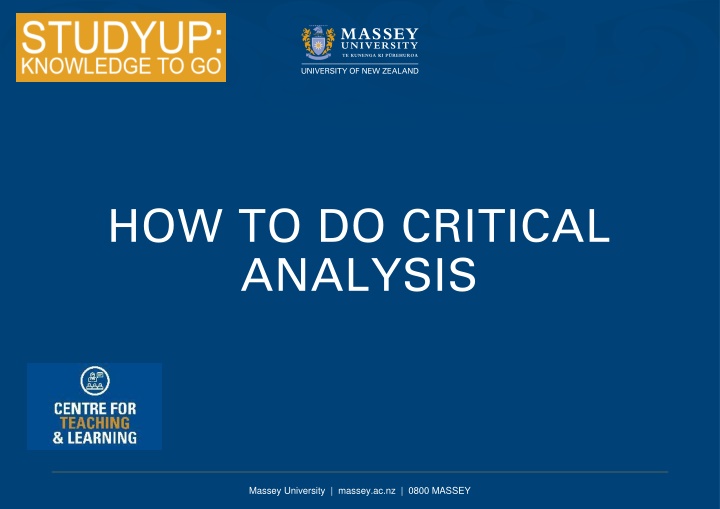
Mastering Critical Analysis at Massey University
Enhance your critical thinking skills at Massey University with a focus on understanding the difference between description and analysis, evaluating evidence supporting arguments, and making effective positions or arguments. Dive into interactive tasks and examples to grasp essential concepts for academic success.
Download Presentation

Please find below an Image/Link to download the presentation.
The content on the website is provided AS IS for your information and personal use only. It may not be sold, licensed, or shared on other websites without obtaining consent from the author. If you encounter any issues during the download, it is possible that the publisher has removed the file from their server.
You are allowed to download the files provided on this website for personal or commercial use, subject to the condition that they are used lawfully. All files are the property of their respective owners.
The content on the website is provided AS IS for your information and personal use only. It may not be sold, licensed, or shared on other websites without obtaining consent from the author.
E N D
Presentation Transcript
STUDYUP: KNOWLEDGE TO GO HOW TO DO CRITICAL ANALYSIS Centre for Teaching and Learning Massey University | massey.ac.nz | 0800 MASSEY
LEARNING OUTCOMES By the end of this session you will be able to understand: The difference between description and analysis How to evaluate the evidence supporting an argument How to evaluate the reasons supporting an argument How to take a position/make an argument Massey University | massey.ac.nz | 0800 MASSEY
INTERACTIVE TASK ONE What is critical thinking? You probably already have some idea of what is meant by critical analysis Try and define critical thinking in one sentence Massey University | massey.ac.nz | 0800 MASSEY
CRITICAL THINKING Critical thinking goes beyond just understanding and describing. It involves assessing the evidence and/or the reasons underlying what is being analysed. It also involves drawing conclusions from others findings. There are various definitions of critical thinking: For example: Critical thinking examines assumptions, discerns hidden values, evaluates evidence, and assesses conclusions (Myers, 2003, p. xv). Massey University | massey.ac.nz | 0800 MASSEY
PART ONE: DESCRIPTION What is description? A description outlines what happened (or what is the case) Assignments may require some description. For example, you may need to define/explain concepts and/or theories or provide some background information to put the topic/issue in context. What is described and how you describe it will vary for different topics. Massey University | massey.ac.nz | 0800 MASSEY
EXAMPLE ONE: DESCRIPTION OF RESULTS Stenlund et al s (2009) randomised controlled trial examined the effects of a cognitively orientated behavioural rehabilitation program and qigong practice (program A) versus qigong practice alone (program B), on psychological variables and sick leave rates in patients with burnout related to workplace stress. Results showed significantly reduced stress behaviour, less fatigue and reduced depression, anxiety and obsessive compulsive symptoms. Effect size was greater in group A than B. A significant reduction in sick leave rates was found for both groups. Massey University | massey.ac.nz | 0800 MASSEY
EXAMPLE TWO: DESCRIPTION OF A CONCEPT The general environment is composed of the economic, global, and sociocultural dimensions, along with the technological and political/legal dimensions. Business and organisations constantly need to adapt to this environment if they are to realise a positive and economically profitable future (Robbins et al., 2013). The general and specific environments together make the external organisational environment and are composed of dimensions that have characteristics beyond the control of an organisation s policies and actions. Massey University | massey.ac.nz | 0800 MASSEY
EXAMPLE THREE: DEFINITION The helping relationship may be defined with the help of Taylor, Lillis, LeMone, and Lynn (2011) as a quality-focused, professional, equal relationship between the health worker and the client, where through effective therapeutic communication and trust, the client s needs are successfully met. Massey University | massey.ac.nz | 0800 MASSEY
INTERACTIVE TASK TWO Why isn t description enough? Why is analysis needed in academic assignments? Try and explain the importance of analysis in one sentence Massey University | massey.ac.nz | 0800 MASSEY
USUALLY, THE BULK OF AN ASSIGNMENT PRESENTS ANALYSIS Description alone is often insufficient for academic assignments because: It just repeats what is in lectures/readings Without critical analysis it can be unclear if the topic has been fully understood It doesn t show evidence of personal synthesis It doesn t provide an appraisal/evaluation It doesn t show any originality It doesn t indicate what conclusion should be reached Massey University | massey.ac.nz | 0800 MASSEY
PART TWO: ANALYSIS Descriptive Writing Critical Analytical Writing States what happened Makes reasoned judgements Gives information Examines assumptions, premises, and conclusions Argues a case according to the evidence Lists details Explains how something works Draws conclusions States what something is like Evaluates evidence States the order in which things happened Evaluates theories Says how to do something Weighs up information Explains what a theory says Indicates why something will work best Notes the method used Evaluates strengths and weaknesses Says when something occurred Identifies the significance Massey University | massey.ac.nz | 0800 MASSEY
WHAT IS ANALYSED AND HOW YOU ANALYSE IT WILL VARY FOR DIFFERENT TOPICS? A common form of analysis is case study analysis Massey University | massey.ac.nz | 0800 MASSEY
ANALYSIS EXAMPLE: APPLICATION TO A CASE Essay question: How is the general environment likely to impact a New Zealand business in the next 10-15 years? The conditions in the economic dimension as reflected in the inflation and interest rates, the continuation of the current growth stage in the economic cycle and the economic pay disparity within New Zealand will have an impact on Fonterra in the next 10-15 years. Currently the New Zealand economy is expanding with a low official cash rate (OCR) being mirrored in the inflation rate, due to the Policy Target Agreement (PTA) between the Reserve Bank of New Zealand and the government requiring inflation at a 1-3% level for the next 5 years (Treasury, 2015). The unfairness of the current low payments to farmers not reflecting the economic climate will most likely result in pressure for Fonterra to make changes in the next 10-15 years. Pressures could also be exerted from outside the economic dimension, for example from political and sociocultural forces, and are likely to be a factor in the reconsideration of an ethical recompense as Fonterra aligns payments with the economic climate affecting farmers. In what ways does the above display critical analysis? Massey University | massey.ac.nz | 0800 MASSEY
APPLICATION TO A CASE The conditions in the economic dimension as reflected in the inflation and interest rates, the continuation of the current growth stage in the economic cycle and the economic pay disparity within New Zealand will have an impact on Fonterra in the next 10-15 years. Currently the New Zealand economy is expanding with a low official cash rate (OCR) being mirrored in the inflation rate, due to the Policy Target Agreement (PTA) between the Reserve Bank of New Zealand and the government requiring inflation at a 1-3% level for the next 5 years (Treasury, 2015). The unfairness of the current low payments to farmers not reflecting the economic climate will most likely result in pressure for Fonterra to make changes in the next 10-15 years. Pressures could also be exerted from outside the economic dimension, for example from political and sociocultural forces, and are likely to be a factor in the reconsideration of an ethical recompense as Fonterra aligns payments with the economic climate affecting farmers. Application Evidence Example Massey University | massey.ac.nz | 0800 MASSEY
PART THREE: EVALUATING ARGUMENTS Before you can evaluate an argument you need to understand what is being argued. Try asking yourself questions like: What are they saying? Why are they saying it? What are their reasons? Once you understand it you will be in a much better position to evaluate it. To evaluate an argument, try asking yourself questions like: Is there any evidence and are their reasons good reasons? Are the examples given truly representative of the whole area? What are we not being told (any unacknowledged assumptions/premises?) Are there other (better) explanations? Massey University | massey.ac.nz | 0800 MASSEY
ASKING (AND ANSWERING) SOME QUESTIONS CAN HELP YOU EVALUATE EVIDENCE For example, if you are evaluating the results of an empirical study, you could ask about: The quality of the evidence? Whether there is any counter evidence? What (if any) is the underlying theory? Are there any weaknesses/limitations? Is the method flawed? Are there any strengths? Does it make a contribution? Massey University | massey.ac.nz | 0800 MASSEY
ANALYSIS EXAMPLE: ANALYSIS OF AN ARGUMENT Essay question: Explain and critically discuss Berkeley s case against objective reality However, there is a problem with Berkeley s premise, because if all we can know by ideas is of ideas, then it seems we can no better conceive of minds than we can of matter (Harrison, 2016). Berkeley (2002) seems to have acknowledged this limitation in part, saying [w]e may be said to have some knowledge or notion of our own minds, of spirits and active beings, whereof in a strict sense have not ideas (p.89). Yet this does not seem a satisfactory resolution. Beyond the ambiguity of claiming only ideas and minds, yet also claiming another means of knowledge, if ideas can tell us of nothing but of ideas, then surely notions can likewise tell us nothing but of notions. This is because to be aware of our notions they must be experienced within mental-states. However, if notions are experienced within mental-states, then by Berkeley s terms they must reside within mental-states. In the case, whichever restrictions hold for knowledge by ideas, should surely hold for notions also. It seems then that Berkeley has now granted us knowledge pertaining to both ideas and notions, but that we still cannot know or conceive of anything beyond their contents. In what ways does the above display critical analysis? Massey University | massey.ac.nz | 0800 MASSEY
ANALYSIS OF AN ARGUMENT However, there is a problem with Berkeley s premise, because if all we can know by ideas is of ideas, then it seems we can no better conceive of minds than we can of matter (Harrison, 2016). Berkeley (2002) seems to have acknowledged this limitation in part, saying [w]e may be said to have some knowledge or notion of our own minds, of spirits and active beings, whereof in a strict sense have not ideas (p.89). Yet this does not seem a satisfactory resolution. Beyond the ambiguity of claiming only ideas and minds, yet also claiming another means of knowledge, if ideas can tell us of nothing but of ideas, then surely notions can likewise tell us nothing but of notions. This is because to be aware of our notions they must be experienced within mental- states. However, if notions are experienced within mental-states, then by Berkeley s terms they must reside within mental-states. In the case, whichever restrictions hold for knowledge by ideas, should surely hold for notions also. It seems then that Berkeley has now granted us knowledge pertaining to both ideas and notions, but that we still cannot know or conceive of anything beyond their contents. Author s criticism of premise Outline of possible response to author s criticism Reason why response to criticism is unsatisfactory Massey University | massey.ac.nz | 0800 MASSEY
PART FOUR: TAKING A POSITION Critical reasoning need not be wholly negative: Think of it as critique rather than being a critic Part of critical reasoning is being constructive: building a positive position/argument When constructing your argument, ask yourself: What are your reasons for giving the answer you are giving? What makes them good reasons? Do I have adequate evidence/examples? How does your conclusion follow from your premises? How do your reasons support your conclusion? Is there any counter-evidence/argument against your argument? What criticisms can be made of your argument? How can you respond to the criticisms of your argument (such that your argument still succeeds)? Massey University | massey.ac.nz | 0800 MASSEY
THESIS STATEMENTS AND POSITION When you take a position and make a statement in response to an essay question, there are generally three positions you can take: Yes No It depends Whichever position you take, say why (the because, the by, the main key ways etc) Massey University | massey.ac.nz | 0800 MASSEY
EXAMPLE ESSAY QUESTION Henry (2011) argues that the game of rugby exemplifies the best of New Zealand culture, however Aitken (2012) states that netball has had a greater influence on life in New Zealand. Does rugby mean more for NZ identity than netball? If taking the middle ground, you still need to state a position! Not like this: Rugby has influenced NZ culture by Netball has influenced NZ culture by More like this: Rugby and netball have both made important contributions to culture in NZ, therefore neither game is more significant for NZ identity than the other. Massey University | massey.ac.nz | 0800 MASSEY
SUMMARY In this session you have learnt how to: Distinguish between description and analysis Evaluate the evidence supporting an argument Evaluate the reasons supporting an argument Take a position/make an argument Massey University | massey.ac.nz | 0800 MASSEY
REFERENCES AND FURTHER READING Cottrell, S. (2008). The study skills handbook. Palgrave Macmillan. Duffin, S. (2006). Reason in the real world. Dunmore Publishing. Warburton, N. (2007). Thinking from A to Z (3rd ed.). Routledge. Massey University | massey.ac.nz | 0800 MASSEY
CENTRE FOR TEACHING AND LEARNING Need help? We have a range of free services to help you with your assignment writing and study skills: Individual Support: Want to discuss your assignment before you hand it in? Want to discuss study skills (e.g. how to manage time)? See next slide for booking information. Pre-Reading Service: Submit a draft assignment and receive individual written feedback on your assignment s structure, focus, referencing, and use of sources. This service is available to first year internal and all distance students. You can access the forum through the Academic Writing and Learning Support site on your Stream homepage. Workshops: Seminars and workshops are run on campus and online, which can help you with writing and study skills, such as essay writing, referencing, and writing research proposals. See here for programmes and registration details. See http://owll.massey.ac.nz/about-OWLL/workshops.php Academic Q+A forum: Ask our consultants a question about academic writing and/or study skills. The Q & A forum is a place for students to receive help with quick, study-related questions. You can access the forum through the Academic Writing and Learning Support site on your Stream homepage. OWLL: Information about academic writing and study skills, including assignment planning, essays, reports, and referencing. Go to http://owll.massey.ac.nz/index.php Disability Services: A range of services and support for students who have health and disability issues that are impacting their study. Pasifika@Massey: Whether studying as an internal or distance student, you can also access Learning support from the Pasifika Learning Advisors. Te Rau Tauawhi: Ko t Te Rau Tauawhi he whina i ng tauira M ori ki te tuku aromatawatai ki Te Reo M ori, ki te tautoko hoki i ng huatanga whakarite tuhinga. The Te Rau Tauawhi M ori Student Centre can help you to submit your assignment in Te Reo M ori and provide general assignment structure support. Massey University | massey.ac.nz | 0800 MASSEY
MASSEY UNIVERSITY CENTRE FOR TEACHING & LEARNING http://ctl.massey.ac.nz/ CAMPUS LOCATIONS: Palmerston North - Manawatu: Centre for Teaching and Learning Student Centre Level 2, Manawatu Campus Phone: + 64 6 951 6540 Email: ctlman@massey.ac.nz We help students with Assignment writing advice Albany: Centre for Teaching and Learning Level 3, Library, Albany Campus Phone: + 64 9 212 7117 Email: ctlalb@massey.ac.nz Academic writing development Understanding assignment questions Citing and writing references Enhancing study skills, like: Wellington: Centre for Teaching and Learning Block 5, Ground Floor (Level A in the Library), Wellington Campus Phone: +64 4 801 5799 extn: 63389 Email: ctlwel@massey.ac.nz Reading techniques Notetaking Time management skills Critical thinking, reading & writing TO BOOK AN APPOINTMENT, GO TO: https://massey-nz.libcal.com/

